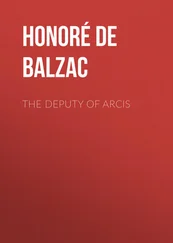“Madame Grandet, what we have to talk about will be Latin to you; it is half-past seven; you can go and attend to your household accounts. Good-night, my daughter.”
He kissed Eugenie, and the two women departed. A scene now took place in which Pere Grandet brought to bear, more than at any other moment of his life, the shrewd dexterity he had acquired in his intercourse with men, and which had won him from those whose flesh he sometimes bit too sharply the nickname of “the old dog.” If the mayor of Saumur had carried his ambition higher still, if fortunate circumstances, drawing him towards the higher social spheres, had sent him into congresses where the affairs of nations were discussed, and had he there employed the genius with which his personal interests had endowed him, he would undoubtedly have proved nobly useful to his native land. Yet it is perhaps equally certain that outside of Saumur the goodman would have cut a very sorry figure. Possibly there are minds like certain animals which cease to breed when transplanted from the climates in which they are born.
“M-m-mon-sieur le p-p-president, you said t-t-that b-b-bankruptcy—”
The stutter which for years the old miser had assumed when it suited him, and which, together with the deafness of which he sometimes complained in rainy weather, was thought in Saumur to be a natural defect, became at this crisis so wearisome to the two Cruchots that while they listened they unconsciously made faces and moved their lips, as if pronouncing the words over which he was hesitating and stuttering at will. Here it may be well to give the history of this impediment of the speech and hearing of Monsieur Grandet. No one in Anjou heard better, or could pronounce more crisply the French language (with an Angevin accent) than the wily old cooper. Some years earlier, in spite of his shrewdness, he had been taken in by an Israelite, who in the course of the discussion held his hand behind his ear to catch sounds, and mangled his meaning so thoroughly in trying to utter his words that Grandet fell a victim to his humanity and was compelled to prompt the wily Jew with the words and ideas he seemed to seek, to complete himself the arguments of the said Jew, to say what that cursed Jew ought to have said for himself; in short, to be the Jew instead of being Grandet. When the cooper came out of this curious encounter he had concluded the only bargain of which in the course of a long commercial life he ever had occasion to complain. But if he lost at the time pecuniarily, he gained morally a valuable lesson; later, he gathered its fruits. Indeed, the goodman ended by blessing that Jew for having taught him the art of irritating his commercial antagonist and leading him to forget his own thoughts in his impatience to suggest those over which his tormentor was stuttering. No affair had ever needed the assistance of deafness, impediments of speech, and all the incomprehensible circumlocutions with which Grandet enveloped his ideas, as much as the affair now in hand. In the first place, he did not mean to shoulder the responsibility of his own scheme; in the next, he was determined to remain master of the conversation and to leave his real intentions in doubt.
“M-m-monsieur de B-B-Bonfons,”—for the second time in three years Grandet called the Cruchot nephew Monsieur de Bonfons; the president felt he might consider himself the artful old fellow’s son-in-law,—“you-ou said th-th-that b-b-bankruptcy c-c-could, in some c-c-cases, b-b-be p-p-prevented b-b-by—”
“By the courts of commerce themselves. It is done constantly,” said Monsieur C. de Bonfons, bestriding Grandet’s meaning, or thinking he guessed it, and kindly wishing to help him out with it. “Listen.”
“Y-yes,” said Grandet humbly, with the mischievous expression of a boy who is inwardly laughing at his teacher while he pays him the greatest attention.
“When a man so respected and important as, for example, your late brother—”
“M-my b-b-brother, yes.”
“—is threatened with insolvency—”
“They c-c-call it in-ins-s-solvency?”
“Yes; when his failure is imminent, the court of commerce, to which he is amenable (please follow me attentively), has the power, by a decree, to appoint a receiver. Liquidation, you understand, is not the same as failure. When a man fails, he is dishonored; but when he merely liquidates, he remains an honest man.”
“T-t-that’s very d-d-different, if it d-d-doesn’t c-c-cost m-m-more,” said Grandet.
“But a liquidation can be managed without having recourse to the courts at all. For,” said the president, sniffing a pinch of snuff, “don’t you know how failures are declared?”
“N-n-no, I n-n-never t-t-thought,” answered Grandet.
“In the first place,” resumed the magistrate, “by filing the schedule in the record office of the court, which the merchant may do himself, or his representative for him with a power of attorney duly certified. In the second place, the failure may be declared under compulsion from the creditors. Now if the merchant does not file his schedule, and if no creditor appears before the courts to obtain a decree of insolvency against the merchant, what happens?”
“W-w-what h-h-happens?”
“Why, the family of the deceased, his representatives, his heirs, or the merchant himself, if he is not dead, or his friends if he is only hiding, liquidate his business. Perhaps you would like to liquidate your brother’s affairs?”
“Ah! Grandet,” said the notary, “that would be the right thing to do. There is honor down here in the provinces. If you save your name—for it is your name—you will be a man—”
“A noble man!” cried the president, interrupting his uncle.
“Certainly,” answered the old man, “my b-b-brother’s name was G-G-Grandet, like m-m-mine. Th-that’s c-c-certain; I d-d-don’t d-d-deny it. And th-th-this l-l-liquidation might be, in m-m-many ways, v-v-very advan-t-t-tageous t-t-to the interests of m-m-my n-n-nephew, whom I l-l-love. But I must consider. I don’t k-k-know the t-t-tricks of P-P-Paris. I b-b-belong to Sau-m-mur, d-d-don’t you see? M-m-my vines, my d-d-drains—in short, I’ve my own b-b-business. I never g-g-give n-n-notes. What are n-n-notes? I t-t-take a good m-m-many, but I have never s-s-signed one. I d-d-don’t understand such things. I have h-h-heard say that n-n-notes c-c-can be b-b-bought up.”
“Of course,” said the president. “Notes can be bought in the market, less so much per cent. Don’t you understand?”
Grandet made an ear-trumpet of his hand, and the president repeated his words.
“Well, then,” replied the man, “there’s s-s-something to be g-g-got out of it? I k-know n-nothing at my age about such th-th-things. I l-l-live here and l-l-look after the v-v-vines. The vines g-g-grow, and it’s the w-w-wine that p-p-pays. L-l-look after the v-v-vintage, t-t-that’s my r-r-rule. My c-c-chief interests are at Froidfond. I c-c-can’t l-l-leave my h-h-house to m-m-muddle myself with a d-d-devilish b-b-business I kn-know n-n-nothing about. You say I ought to l-l-liquidate my b-b-brother’s af-f-fairs, to p-p-prevent the f-f-failure. I c-c-can’t be in two p-p-places at once, unless I were a little b-b-bird, and—”
“I understand,” cried the notary. “Well, my old friend, you have friends, old friends, capable of devoting themselves to your interests.”
“All right!” thought Grandet, “make haste and come to the point!”
“Suppose one of them went to Paris and saw your brother Guillaume’s chief creditor and said to him—”
“One m-m-moment,” interrupted the goodman, “said wh-wh-what? Something l-l-like this. Monsieur Gr-Grandet of Saumur this, Monsieur Grandet of Saumur that. He l-loves his b-b-brother, he loves his n-nephew. Grandet is a g-g-good uncle; he m-m-means well. He has sold his v-v-vintage. D-d-don’t declare a f-f-failure; c-c-call a meeting; l-l-liquidate; and then Gr-Gr-Grandet will see what he c-c-can do. B-b-better liquidate than l-let the l-l-law st-st-stick its n-n-nose in. Hein? isn’t it so?”
Читать дальше












